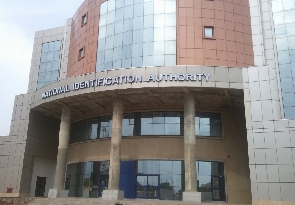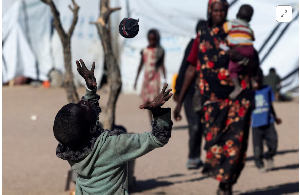“There is always a way and always hope in the next sunrise, and in the next second, and in the next minute” (Ziggy Marley).
FOOD FOR THOUGHT: A REMARKABLE STORY ABOUT THE CORRUPT MINDSET OF THE TYPICAL GHANAIAN
It is quite obvious that we cannot seem to get over our grudging infatuation with institutional corruption and its negative implications for the nation’s development economics. This is largely because we do not think either the NPP or the NDC is the solution to our myriad structural problems.
For that matter, both the NDC and the NPP are a real stumbling block to the country’s economic and political development—a cog in the wheel of national development. As a matter of fact this is not a self-serving understatement, rather, a statement borne out of the rational verdict of cold facts.
This author recalls with vivid and detailed intimacy some influential persons’ attempts to lure him to the camps of both the NPP and the NDC. These persons whose anonymity we promised to protect from the inquiring gossip tabloid of public intimacy, said they wanted to engage this author’s research and writing services in advancing their parties’ propagandistic politicking—in exchange for mouth-watering remuneration packages, including scholarships to study anywhere of his choosing.
The author then inquired from these persons how they were going to come up with these attractive remuneration packages. More often than not a response arrived in the form of tactical evasion or avoidance, or simply of grudging circumlocution. Yet, not to be outdone, this author did not let up on his insistence that he be thoroughly educated about the sources of these remuneration packages.
Eventually a response did come. The shocking answer was that by offering these services for a tenure of just one term under, say, a potential Akufo-Addo presidency or a Mahama incumbency, this author stood a chance of becoming rich. It is however our submission that Akufo-Addo’s stern warning if it has the power of institutional muscularity, that those who want to make money should not join his government but rather the public sector, certainly will not see the light of day in our reckoning.
When it is about kickbacks, we need not look further than the private sector. In other words it is rather the private sector where our corrupt politicians make most of their corrupt money, their hush money. We have seen this in the dubious disbursements of numerous illegal judgments debts to contractors and persons in the private sector. We should not also gloss over the fact that there exists as much incompetence and corruption and mediocrity in the private sector as in the public sector.
Thus let us not oversimplify the convoluted difficulties the private sector faces, unnecessarily raise our expectations as though the private sector is a model of excellence, and think the private sector is any better than the public sector for that matter. All the problems we face in the public sector are right there in the private sector. What is more, it is the same private sector that will be refilling Akufo-Addo’s emptied or dwindled campaign coffers. And is our strong suspicion that this will be achieved through kickbacks. Both major political parties have done this. It is no close secret.
Significantly, though, it does not take rocket science to know these, and we therefore wonder why these basic facts are lost on Akufo-Addo. These basic facts also probably call into question Akufo-Addo’s much-vaunted commitment to the fight against institutional corruption.
Again, notwithstanding the foregoing reservations, these persons who had hitherto been reading this author’s articles on social media and mistaken him for a staunch member of the Convention People’s Party (CPP), cited the examples of Kweku Baako, Jr., Freddie Blay, and Kwesi Pratt, Jr. to hammer their enticing points home, all of whom no doubt have become rich on account of their dissociation from the CPP.
In fact, they were shocked and even politically distraught when this author told them to their faces that as far as he was concerned, he was not, and has never been, a member of any political party in Ghana. And even as of this writing, this author is not a member of or linked to any political party in the country. As a matter of fact, we have always taken a keen interest in partisan politics purely for intellectual and philosophical reasons—no more.
Even so, they demanded a percentage cut from the proposed remuneration packages in advance once we agreed to accept their offers and they, in turn, had finalized our formal introduction to the honchos of their respective parties. We flatly rejected the offers on ethical and moral grounds.
On the other hand, we were also given the impression that our consistent moral sermonizing on social media did not stand a chance of changing the corrupt mindset of the average Ghanaian, let alone those of our politicians, and for that reason, and perhaps that reason alone, it will be in our best interest, in fact incumbent upon us to get on the bandwagon of institutional corruption as all Ghanaians have already done, were and are learning to do.
When all is said and done, we never exactly told anything useful about the sources of those remuneration packages. This is unfortunate.
This further confirmed our suspicions that neither Akufo-Addo nor President Mahama is probably going to be able to bring about the change required to transform Ghanaian society for the better, at least if we should go by the deep-rooted corrupt mindsets of some of those influential persons, just like those anonymous persons we spoke to, who will eventually be working closely with one leadership or another of the country.
This is the more reason why we have consistently rejected our kleptomaniacal duopoly as we do not want to scar or put our conscience in jeopardy.
Far more importantly, though, Dr. Kofi Kiss Dompere was also right when he poignantly wrote that, Ghanaian politics, for all intents and purposes, operated on an emotional wavelength of “cognitive imbecility.”
This makes sense perfect sense given the troubling context of members of the ruling class who have mostly originated in the booboisie. Thus cognitive imbecility is the fulcrum on which our duopolistic idiocracy rotates.
Fact is, how can we be doing cheap propaganda with the lives of our hardworking citizens and their collective destiny when we should rather be seriously concerned about developing our country, improving the standards of living and quality of life of the masses?
Has the Ghanaian brand of duopolistic boobocrats any useful and pragmatic ideas to offer our citizens, Africa and the world at large?
Certainly not that we know of! That is, we don’t think so!
OTHER PRESSING CONCERNS
Who does not want to make money when everyone else is making money? What if this money is legitimate?
Is Akufo-Addo using coded language or merely doing dog-whistle politics? How did he finance his campaign?
And who will be stupidly bold to declare his true intentions of making money as a potential member of an Akufo-Addo government before being assigned a political office as such?
Will an Akufo-Addo government make Madam Dzifa Ativor a member of his cabinet if she were to publicly give a prior indication of her intentions in the bus branding controversy?
In effect, then, Akufo-Addo may be sending the wrong signals to the international community, foreign investors, and Ghanaians as a whole. It is as though he has no intimate knowledge of the caliber of men and women who will be working in his government. It also tells Ghanaians on Akufo-Addo’s questionable leadership caliber.
But then again any “intelligent,” scheming person will hide his true intentions of illegally amassing wealth from Akufo-Addo until he or she formally assumes political office. For the foregoing reason, we believe Akufo-Addo may have forgotten too soon that potential political appointees could have learnt some useful life lessons from Victoria Hammah’s scandalous experience.
AKUFO-ADDO AND THE SCHEMING AKYEM ILLUMINATI
Nigerians are beginning to learn about this phenomenon the hard way under the once-promising Buhari government.
We can recall the sensational revelation Buhari’s wife, Madam Aisha Buhari brought to the attention of the international community, that a gang of politicians had succeeded in hijacking her husband’s party and that this same gang had been preferentially dishing out political offices and appointments to friends and colleagues without her husband’s express knowledge of who those political appointees were.
That is, Buhari did not know who was being appointed for which political office. Likewise, in the NPP the Akyem Mafia and Akyem-related ethnocentric hegemonists and nationalists are alive and well.
Besides though not a member of the Akyem Mafia per se, a labile or volatile character like Kennedy Agyapong does not deserve any high-profile political appointment that directly interfaces with the international community. Ken for one is proverbially known for his political gaffes, moral and diplomatic unintelligence, and emotional dysregulation.
This brings us to the final point of primary concern to us: If Akufo-Addo truly wants to be president for all Ghanaians then he must as well be proactive, or else the Akyem Mafia and nationalists will forever exile expectations of ethnic representation in his government to a dystopian dreamland.
In fact, ethnic representation is more than required in the Akufo-Addo government to checkmate any potential materialization of nepotism and cronyism in which the Akyem Mafia or Illuminati particularly dominates. This is largely because we have witnessed one form or another of this troubling phenomenon in almost all the governments that have graced the Fourth Republic. Again, this phenomenon has sometimes bred mediocrity and corruption. Ghanaians should resist it.
He cannot but do the exact opposite of what Bobby Brown sings about on the track—“My Prerogative.”
CONCLUDING REMARKS FOR PART 3
“Ears that do not listen to advice, accompany the head when it is chopped off” (An African proverb).
It is not even guaranteed that an independent prosecutor may perform assigned tasks free from the scourge of partisan bias.
Again, in Ghana everything is so politicized to the extent that the proposed office of an independent prosecutor could turn out a nominal designation only.
Our submission is that forensic investigators from the Economic Community of West African States (ECOWAS) and the African Union (AU) may be contracted to provide these much-needed services.
Neither do we think a bipartisan approach to sorting out the messy epidemiological underpinnings of institutional corruption will work out for the common good. Conflict of interest, political partisanism, lack of transparency, and nagging undercurrents of political equalization are the primary problems here given also that the two major political have never worked well together.
We can probably understand why the outgoing NDC government is dishing out new contrasts, which we perceive essentially as a strategic and tactical replication of a controversial legacy the ethnocentric corruptocrat Kufuor left behind. Possible disbursements of illegal judgment loom large in the horizon!
Well, for all we know, the outgoing government may have acted within the remit of the law or the scope of its constitutional mandate. Whether this is actually the case, or whether such last-minute arrangements reek of bad faith and ignore the basic tenets of gentleman’s agreement, time will tell.
Then again, in Ghana, truth and lies coexist in a state of destructive harmony or equilibrium. A Ghanaian tells the truth, and it is a pretentious lie. The reverse is always the case—both situations responding so well to the Le Châtelier's Principle, so-called. Why Ghana continues to survive this deadly universal metastasis of institutional corruption in the bone marrows of her body politic defeats the imagination.
The institutional survival of the Ghanaian body politic under the Sisyphean burden of corruption and mediocrity defies the logic and locus of purposeful appreciation of the intricacies of statecraft. This comes against the backdrop that every institution in the country is hopelessly corrupt.
From religious institutions, to parliament, to the judiciary, to the executive, to educational institutions, to anti-corruption bodies such as the Commission on Human Rights and Administrative Justice (CHRAJ), to Civil Society Organizations (CSOs), to Non-Governmental Organizations (NGOs), to security and intelligence outfits such as the Bureau of National Investigations (BNI) and the Criminal Investigations Department (CID), institutional corruption reigns supreme and controls every pore of human existence. None of these institutions is independent.
Other than that institutional corruption is the oxygen that flows through the hemodialysis of social decay, of urban blight. Ghana is actually bleeding from the universal metastasis of institutional corruption yet it also appears to be surviving on the sheer basis of it, of institutional corruption, namely, perhaps the greatest irony of the century.
Like the unbearable stench of open defecation across the country, the conscience of the nation appears to be bleeding profusely from the debilitating contraindications of institutional corruption. Ghana, a once-beautiful country finds itself in a dire state of homeopathic contradictions.
Let us just state for the record that the sentence, “Bugri Naabu cries out for justice” for all intents and purposes, evokes a strong sense of figurative titularity for us, figurative because it represents institutional corruption in the Ghanaian body politic and the corruptibility of Bugri Naabu, of Akufo-Addo and of President Mahama, for which the country and its good citizens are crying out for justice—remedial or corrective justice.
Simply put, “Buhgri Naabu” is a carefully crafted Orwellian trope which eventually resolves itself into all that is woefully bad and even negative, morally reprehensible about Ghanaian leadership and society, as well as character—and deserving of the most radical of corrective solutions.
The only probable stumbling block to this pragmatic measure of corrective realization is the Ghanaian’s ossified resistance to real, sustainable change, an ossified attitude buried under interlocking rocks of general apathy, ignorance and superstition, religious naivety, and universal celebration of mediocrity.
Is there hope for Ghanaians, their leadership and aspirations, their collective destiny and for the Ghanaian society at large?
We do not know for certain. Only time appears to be in the know, although sadly enough man is not consequently of time let alone be or define the gracious epitome of time. What we do know for a fact is that time is both long and short and that it will surely tell someday—nonetheless.
In any case is Bugri Naabu listening? And if so, is it possible that he is crying out for justice in behalf of Ghana?
We shall return…
Opinions of Friday, 30 December 2016
Columnist: Kwarteng, Francis
Bugri Naabu cries out for justice 4
Entertainment













